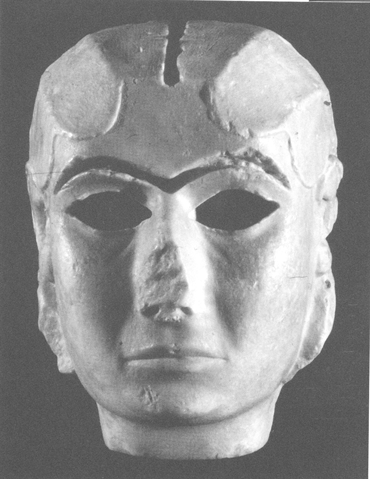By Ronda Kaysen
Matthew Bogdanos went to Iraq to fight a war. He did not expect to fight for some of the world’s oldest artifacts, looted from the National Museum in Baghdad — a battle he’s continuing here in New York.
In the days after Baghdad fell to coalition forces in 2003, thousands of artifacts were looted from the National Museum, setting off an international firestorm in the press — which overstated the scale of the looting by a factor of 10 — and the international community, which unleashed its wrath on the United States-led invasion.
Bogdanos, a colonel in the U.S. Marines stationed in Basra, first heard the reports from an outraged journalist. “You macho [expletive] are down here looking for missiles and money, and the finest museum in the world in Baghdad has just been looted,” the reporter scolded in Bogdanos’s 2005 book, “Thieves of Baghdad: One Marine’s Passion to Recover the World’s Greatest Stolen Treasures.”
Bogdanos had been recalled to active duty after 9/11 as part of a counter-terrorism force that sent him to Afghanistan, the Horn of Africa and Iraq — he had not been sent around the globe to protect ancient jewelry.
The 49-year-old Battery Park City resident had evacuated his pregnant wife and two small children through the fog of dust and debris after the second tower collapsed on 9/11. Citing security concerns, he declined to say where in Battery Park City he lives or where his children — he now has four of them — go to school. “Do you know what kind of work I do,” he barked, when asked.
Despite a gruff demeanor, the journalist apparently screamed at the right “macho” marine. Bogdanos harbored a love for antiquity and received a law degree and a masters degree in Classical Studies from Columbia University and is an assistant district attorney in the Manhattan D.A.’s office Downtown. (He prosecuted Sean “P. Diddy” Combs for gun charges.)
In the chaotic days after Hussein fell, Bogdanos took it upon himself to secure reluctant permission from his superiors, travel north to Baghdad with his troops and launch an investigation into what happened to the artwork.
A slim, compact man with salt and pepper hair, startling green eyes and a serious chip on his shoulder, Bogdanos is responsible for rescuing some of the world’s most precious antiquities, most of which would probably still be missing today if it weren’t for his tenacity.
“The vast majority of the time [that I was in Iraq and Afghanistan] I was doing bad things to bad people, the antiquities was an ideal, wonderful, golden way to rise up out of that mire,” he told Downtown Express, sitting at Au Bon Pain overlooking Gateway Plaza in the World Financial Center last week.
“Thieves of Baghdad,” written with William Patrick, tells the story of how Bogdanos defied his superiors, set up camp inside the museum with a team of 14 customs agents and military officers and recovered 5,400 of the approximately 14,000 missing pieces of art, including the 10 most important stolen pieces. At least 8,500 pieces remain missing. Another 62,000 missing objects were found in various locations in Baghdad.
Bogdanos’s team recovered the vast majority of the missing artifacts through an amnesty program, traipsing to cafes, marketplaces and mosques to convince Iraqis that there would be no consequences for returning the stolen goods. Iraqis began streaming into the museum with tips of where precious pieces had gone.
The limestone Mask of Warka was located in a backyard north of Baghdad and the 4,300-year-old Basetki Statue was found immersed in a cesspool. The Golden Harp of Ur and the golden helmet of King Meskalamdug had simply been moved to a vault. Smugglers bound for Iran were stopped at a checkpoint in southern Iraq with 465 artifacts, mostly cuneiform tablets, amulets, pendants and cylinder seals stolen from the museum. The smugglers escaped, but the goods were returned.
While many of the artifacts had been looted from the museum floor, others had been painstakingly lifted from the museum’s inner basement, clearly an inside job abetted by museum staffers.
A native New Yorker, Bogdanos grew up in Manhattan, one of four boys in a Greek family that owned several restaurants. He grew up working in the restaurants with his family, enlisting customers to help him with his homework when he wasn’t waiting tables, peeling shrimp or ringing orders. An avid boxer, he only went to college after a military recruiter suggested he become an officer rather than an enlisted Marine.
He moved to Battery Park City 16 years ago when the neighborhood was far smaller than it is now. “I like the neighborhood, I like the people,” he said. “It’s very family-friendly.” He never considered moving after 9/11—“I’m not going to let 19 terrorists dictate where I live.”
But for all Battery Park City’s family-friendly qualities, it is not a neighborhood brimming with military families. He knows no others in the area, although there are a few veterans of the Iraq war living in the neighborhood. Being a military family in the city that has been at the center of the anti-Bush and anti-war activism in the country is a lonely experience, he said. But, true to his form, he takes comfort in the city’s history, citing the Civil War draft riots of 1863 that rocked New York City for five days and left large swaths of Manhattan ablaze. “It was hard for my wife to be surrounded by people who were so opposed to what we were doing — it was hard to hear that,” he said. “But it helps to put this into perspective.”
There are many villains in “Thieves of Baghdad”—and not all of them are the looters. He blames the journalists for misreporting the number of missing artifacts. “I’m not harsh on journalists,” he clarified to Downtown Express. “I am harsh on bad journalists.” But without the attention in the press, Bogdanos would have never heard of the looting, and even if he had, he would have never gotten the permission to mobilize the response that he did.
There are other villains in Bogdanos’s book, too. There are the Madison Ave. and Bond St. art collectors who are complicit in the illicit antiquities trade. And there are the archeologists who criticized the invasion of Iraq, but dug for artifacts during Saddam Hussein’s purges and said nothing. “You can’t give Hussein a pass and then call Bush all sorts of vile names,” he said.
And then there are the “typical, well-educated Manhattan-types who appear to maintain a fashionable suspicion of, if not outright contempt for, the police and the military, but in a crisis they were looking to me for help,” he wrote of his neighbors who turned to him for help in the moments after the Twin Towers fell.
His anger lies in stark contrast to what is clearly a passion for history. Literature has a way of seeping into all of Bogdanos’s conversations. When he speaks, he cannot help to quote Euripides, the Bible and Shakespeare, whether he is discussing ancient artwork or New Yorkers’ feelings about war.
For Bogdanos, antiquities connect people with a shared past and offer a common language in a world increasingly divided by sectarian strife. “Our shared cultural history offers us, perhaps, our best chance of bridging that divide.”
At times, Bogdanos seems aware of the pitfalls of his literary obsessions. En route to Baghdad, he lured his troops to the ruins of Babylon, giving them an impromptu tour of one of the world’s oldest cities. On the way back from the ruins, he realized the detour would cost his troops precious hours of daylight. “Studying my map for a way out of this Hobson’s choice, I was silently—but vigorously—reproaching myself for having jeopardized my team’s safety with my grad-student indulgence,” he wrote.
Shortly after his return to the U.S. in 2005, customs inspectors at Newark Airport discovered four Federal Express boxes containing 669 artifacts stolen from the museum. The smugglers and the intended recipient alluded authorities. Now in the Reserves, Bogdanos is at the Manhattan D.A.’s office, continuing to search for antiquities in a position that never previously existed.
The illicit trade of antiquities is helping fuel the insurgency in Iraq, he said, and collectors who turn a blind eye to the trade are complicit in it. “These facilitators who believe they are engaged in benign criminal activity… might be ‘shocked’ that they are helping finance the drug trade, as well as international terrorism,” he wrote.
The international community has been of little help, he said. The United Nations Educational Scientific and Cultural Organization has no commission to investigate the worldwide antiquities trade, and has dismissed Bogdanos’s requests to discuss the matter.
Bogdanos hopes to lessen the world’s apathy to the antiquities trade. “Antiquities will never rise to the level of attention as violence or terrorism or human trafficking,” he said. “But I want antiquities to be on that list. I want there to be a dialogue.”
Matthew Bogdanos will speak at the P.S./I.S. 89 auditorium on Warren and West Sts. on Monday, April 10 at 6 p.m. about “Thieves of Baghdad.” The event is free and open to the public.
WWW Downtown Express



























